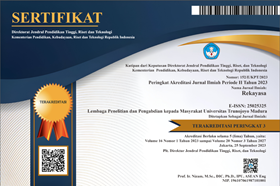Spatial-Temporal Variation of Land Use Changes In Ambon City
Abstract
Changes in land use have caused various spatial consequences that occur substantially in an area. This study examines the pattern of land use changes from different room variations. The research was at a location in Ambon City. The materials in this study are Landsat 8 OLI/TIRS in 2010 and 2020, DEM SRTM, administrative maps, and development center maps. Research data were analyzed descriptively analytical, spatial, and temporal from the overlay results. The study results in show changes over ten years (2010-2020), indicating an increase in settlements covering an area of 23,810 ha per year. Differences in spatial variations based on administrative site, additional blocks in Sirimau District covering an area of 76,880 ha, and withdrawal of the most significant land in mixed gardens surrounding an area of 58,859 ha. In addition, there was additional weaponry on steep slopes (15 -30%) covering an area of 38,503 ha and a protected area of 16,505 ha by converting the use of forest land covering an area of 17,366 ha, and most of it took place in the city center. The addition of settlements also occurred in an accessibility (less than 3 km) area of 116,370 ha, most scattered in the secondary center of 86,520 ha.
Keywords
Full Text:
PDFReferences
Angel, S., Parent, J., Civco, D. L., Blei, A., & Potere, D. (2011). The dimensions of global urban expansion: Estimates and projections for all countries, 2000-2050. Progress in Planning, 75(2), 53–107. https://doi.org/10.1016/j.progress.2011.04.001
Ariti, A. T., van Vliet, J., & Verburg, P. H. (2015). Land-use and land-cover changes in the Central Rift Valley of Ethiopia: Assessment of perception and adaptation of stakeholders. Applied Geography, 65, 28–37. https://doi.org/10.1016/j.apgeog.2015.10.002
Asche, F., Bellemare, M. F., Roheim, C., Smith, M. D., & Tveteras, S. (2015). Fair Enough? Food Security and the International Trade of Seafood. World Development, 67, 151–160. https://doi.org/10.1016/j.worlddev.2014.10.013
Bukhari, E. (2021). Pengaruh Dana Desa dalam Mengentaskan Kemiskinan Penduduk Desa. Jurnal Kajian Ilmiah, 21(2), 219–228. https://doi.org/10.31599/jki.v21i2.540
Butt, A., Shabbir, R., Ahmad, S. S., & Aziz, N. (2015). Land use change mapping and analysis using Remote Sensing and GIS: A case study of Simly watershed, Islamabad, Pakistan. Egyptian Journal of Remote Sensing and Space Science, 18(2), 251–259. https://doi.org/10.1016/j.ejrs.2015.07.003
Edan, M. H., Maarouf, R. M., & Hasson, J. (2021). Predicting the impacts of land use/land use change on land surface temperature using remote sensing approach in Al Kut, Iraq. Physics and Chemistry of the Earth, Parts A/B/C, 123, 103012. https://doi.org/https://doi.org/10.1016/j.pce.2021.103012
Febianti, V., Sasmito, B., & Bashit, N. (2022). Pemodelan perubahan tutupan lahan berbasis penginderaan jauh. Jurnal Geodesi Undip, 11(3), 1–10. https://ejournal3.undip.ac.id/index.php/geodesi/article/view/36939
Folberth, C., Khabarov, N., Balkovič, J., Skalský, R., Visconti, P., Ciais, P., Janssens, I. A., Peñuelas, J., & Obersteiner, M. (2020). The global cropland-sparing potential of high-yield farming. Nature Sustainability, 3(4), 281–289.
Foley, J. A., Ramankutty, N., Brauman, K. A., Cassidy, E. S., Gerber, J. S., Johnston, M., Mueller, N. D., O’Connell, C., Ray, D. K., West, P. C., Balzer, C., Bennett, E. M., Carpenter, S. R., Hill, J., Monfreda, C., Polasky, S., Rockström, J., Sheehan, J., Siebert, S., … Zaks, D. P. M. (2011). Solutions for a cultivated planet. Nature, 478(7369), 337–342. https://doi.org/10.1038/nature10452
Ghasemkhani, N., Vayghan, S. S., Abdollahi, A., Pradhan, B., & Alamri, A. (2020). Urban development modeling using integrated fuzzy systems, ordered weighted averaging (OWA), and geospatial techniques. Sustainability (Switzerland), 12(3). https://doi.org/10.3390/su12030809
Haack, B. N., & Rafter, A. (2006). Urban growth analysis and modeling in the Kathmandu Valley, Nepal. Habitat International, 30(4), 1056–1065. https://doi.org/https://doi.org/10.1016/j.habitatint.2005.12.001
Hapsary, A., Shandra, M., Subiyanto, S., & Firdaus, H. S. (2021). Analisis prediksi perubahan penggunaan lahan dengan pendekatan artificial neural network dan regresi logistik di Kota Balikpapan. Jurnal Geodesi UNDIP, 10(2), 88–97. https://ejournal3.undip.ac.id/index.php/geodesi/article/view/30637
Harahap, F. R. (2013). Dampak urbanisasi bagi perkembangan kota di Indonesia. Jurnal Society, I(1), 35–45. https://doi.org/https://doi.org/10.33019/society.v1i1.40
Hidayah, Z., Armono, H. D., Wardhani, M. K., & Wiyanto, D. B. (2022). The Application of Multi Temporal Satellite Data For Land Cover Mapping of Bawean Island, East Java. Geosfera Indonesia, 7(3), 207-218.
Kubangun, S. H., Tola, K. S. K., & Bachri, S. (2019). Analisis Spasial Perubahan Penggunaan Lahan Untuk Mitigasi Bahaya Lahan Kritis di Kabupaten Manokwari. Agrotek, 7, 33–42. https://doi.org/https://doi.org/10.46549/agrotek.v7i2.283
Kumar, R. (2022). Remote Sensing and GIS-Based Land Use and Land use Change Detection International Journal of Research Publication and Reviews Remote Sensing and GIS-Based Land Use and Land use Change Detection Mapping of Jind District , Haryana. International Journal of Research Publication and Reviews, 3(3), 869–874. https://ijrpr.com/v3i3.php
Kusrini, Suharyadi, & Hardoyo, S. R. (2011). Perubahan penggunaan lahan dan faktor yang mempengaruhinya di Kecamatan Gunungpati Kota Semarang. Majalah Geografi Indonesia, 25(1), 25–40. https://doi.org/10.1515/9783110523522-024
Lamidi, L., Sitorus, S. R., Pramudya, B., & Munibah, K. (2017). Perubahan Penggunaan Lahan Di Kota Serang, Provinsi Banten. Tataloka, 20(1), 65. https://doi.org/10.14710/tataloka.20.1.65-74
Lasaiba, M. A. (2013). Kajian Keruangan Penggunaan Lahan Dalam Pengembangan Kota Ambon Berbasis Ekologi. Jurnal Pendidikan Geografi UNESA, 11(21), 34–56. https://statik.unesa.ac.id/profileunesa_konten_statik/uploads/geofish/file/bd7a3d54-262c-4662-acac-49bead6fe026.pdf
Liao, J., Shao, G., Wang, C., Tang, L., Huang, Q., & Qiu, Q. (2019). Urban sprawl scenario simulations based on cellular automata and ordered weighted averaging ecological constraints. Ecological Indicators, 107(July), 105572. https://doi.org/10.1016/j.ecolind.2019.105572
Mosammam, H. M., Nia, J. T., Khani, H., Teymouri, A., & Kazemi, M. (2017). Monitoring land use change and measuring urban sprawl based on its spatial forms: The case of Qom city. Egyptian Journal of Remote Sensing and Space Science, 20(1), 103–116. https://doi.org/10.1016/j.ejrs.2016.08.002
Mujiandari, R. (2014). Perkembangan Urban Sprawl Kota Semarang pada Wilayah Kabupaten Demak Tahun 2001-2012. Jurnal Wilayah Dan Lingkungan, 2(2), 129. https://doi.org/10.14710/jwl.2.2.129-142
Nuraeni, R., Risma, S. P. sitorus, & Retno, dyah panuju. (2017). An Analysis of Land Use Change and Regional Land Use Planning in Bandung Regency. Buletin Tanah Dan Lahan, 1(1), 79–85. https://journal.ipb.ac.id/index.php/btanah/article/view/17695
Salerno, F., Gaetano, V., & Gianni, T. (2018). Urbanization and climate change impacts on surface water quality: Enhancing the resilience by reducing impervious surfaces. Water Research, 144, 491–502. https://doi.org/https://doi.org/10.1016/j.watres.2018.07.058
Sari, Y. A. (2022). Pemetaan Sebaran Daerah Rawan Kekeringan Menggunakan Citra Landsat 8 Oli/Tirs Di Kabupaten Banyuwangi. Jurnal Pendidikan Geografi Undiksha, 10(3), 233–242. https://doi.org/https://doi.org/10.23887/jjpg.v10i3.44750
Setiawan, C., & Rachman, F. R. A. (2020). Remote Sensing Imagery and GIS for Monitoring the Pyroclastic Material of Mount Sinabung. Forum Geografi, 33(December 2019), 184–195. https://doi.org/10.23917/forgeo.v33i2.9223
Sitorus, S. R. P., Leonataris, C., & Panuju, D. R. (2012). Analisis Pola Perubahan Penggunaan Lahan Dan Perkembangan Wilayah Di Kota Bekasi, Provinsi Jawa Barat. Jurnal Ilmu Tanah Dan Lingkungan, 14(1), 21. https://doi.org/10.29244/jitl.14.1.21-28
Song, X. P., Hansen, M. C., Stehman, S. V., Potapov, P. V., Tyukavina, A., Vermote, E. F., & Townshend, J. R. (2018). Global land change from 1982 to 2016. Nature, 560(7720), 639–643. https://doi.org/10.1038/s41586-018-0411-9
Sya’ban, M. B. A., & Adiputra, A. (2020). Spatial Analysis of Earthquake Vulnerability Based on Geographic Information System ( GIS ) in Disaster Mitigation Efforts. SPATIAL: Wahana Komunikasi Dan Informasi Geografi, 20(1), 31–44. http://journal.unj.ac.id/unj/index.php/spatial/article/view/14469
Tesfaw, A. T., Pfaff, A., Golden Kroner, R. E., Qin, S., Medeiros, R., & Mascia, M. B. (2018). Land-use and land-cover change shape the sustainability and impacts of protected areas. Proceedings of the National Academy of Sciences of the United States of America, 115(9), 2084–2089. https://doi.org/10.1073/pnas.1716462115
Wahyuni, S., Guchi, H., & Hidayat, B. (2014). Analisis Perubahan Penggunaan Lahan dan Penutupan Lahan Tahun 2003 dan 2013 di Kabupaten Dairi. Jurnal Online Agroteknologi, 2(4), 1310–1315. https://jurnal.usu.ac.id/index.php/agroekoteknologi/article/view/8420
Wang, X., Shi, R., & Zhou, Y. (2020). Dynamics of urban sprawl and sustainable development in China. Socio-Economic Planning Sciences, 70(June 2019), 100736. https://doi.org/10.1016/j.seps.2019.100736
Wicaksono, A., & Hidayah, Z. (2022). Pemanfaatan Sistem Informasi Geografis Berbasis Web dalam Meningkatkan Akurasi Informasi Terkait Rekam Jejak Sumur Minyak dan Gas Bumi. Jurnal Sains dan Teknologi, 11(2), 362-370.
Yulianto, F., Maulana, T., & Khomarudin, M. R. (2019). Analysis of the dynamics of land use change and its prediction based on the integration of remotely sensed data and CA-Markov model , in the upstream Citarum Watershed , West Java , Indonesia. International Journal of Digital Earth, 12(10), 1151–1176. https://doi.org/10.1080/17538947.2018.1497098
Yunus, H. S. (2008). Dinamika wilayah peri-urban: determinan masa depan kota. Pustaka Pelajar.
DOI
https://doi.org/10.21107/rekayasa.v16i1.18799Metrics
Refbacks
Copyright (c) 2023 Mohammad Amin Lasaiba

This work is licensed under a Creative Commons Attribution-ShareAlike 4.0 International License.
























